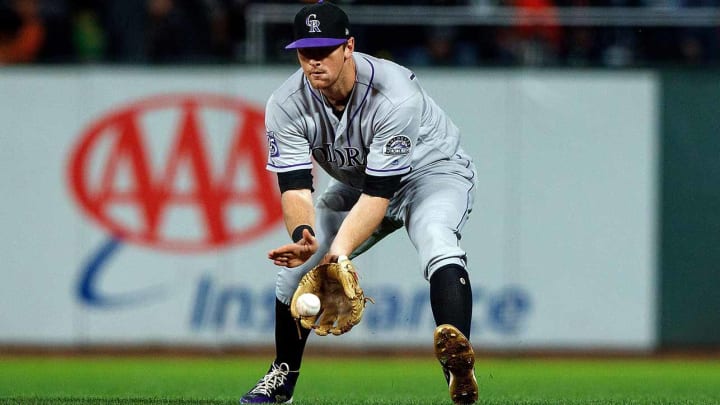DJ LeMahieu Is the Clearest Sign Yet That the Yankees Won't Pay for Manny Machado

All winter long, we’ve been waiting—depending on where you stand, either expectantly or with dread—for the tweet from one of baseball’s more trustworthy rumor-mongers that finally links Manny Machado with the Yankees. It’s the prophecy that was written in the stars long ago. Thousands of years ago, mysterious beings drew this union in the Nazca Lines in Peru, of a figure loafing toward first base while a stick figure bearing an interlocking NY logo hands him a big bag with a dollar sign on it. It’s the kind of prediction you could comfortably make, even while the nouveau riche teams like the Phillies and Cubs and Dodgers lurked. “Manny Machado will be a Yankee,” you safely surmised, betting that the allure of his ultra-elite talent at a premium position for a World Series contender wouldn’t stop even New York’s most tight-fisted bean counters from showering him with money.
So far, though, Brian Cashman has delighted in spitting on your hopes. His latest expectorated wet globule on the dreams of Yankees fans coast to coast: the addition of free-agent second baseman DJ LeMahieu, late of the Rockies, on a two-year deal worth $24 million. By himself, LeMahieu would do little to steer the Yankees and Machado apart, given that he plays a different position and will make a fraction of what Machado will eventually earn. But added to the increasingly large and confusing pile of infielders now in the Bronx, he’d seem to be the loudest shout yet that Machado won’t be donning pinstripes.
The case for LeMahieu is pretty straightforward. He’s a good defender at an important position. He won a batting title two years ago and has a career .298/.350/.406 line—nothing to scream about, but perfectly cromulent. He is, by all accounts, a hard worker and a good clubhouse guy. He’s the kind of player contending teams used to sign eagerly all the time, tabbing a veteran to plug into a problematic spot and hold the line.
But there’s a reason LeMahieu has hung around free agency past the start of the year, and it’s not just because baseball owners have decided that spending is for chumps. (Though that is a big reason why.) LeMahieu has plenty of red flags flying. He doesn’t draw walks and hasn’t hit for much power in his career. That 2016 batting title was fueled by a sky-high .388 batting average on balls in play. Drop that to last year’s .298—which was just a tick above the league average—and you get a performance as empty as can be: .276/.321/.428, good for an 88 OPS+ that puts him alongside bummers like Freddy Galvis and Ian Desmond in terms of production. Then there’s the biggest worry of them all: Since becoming a regular with the Rockies in 2013, LeMahieu has hit a majestic .331/.391/.449 at Coors Field … and a less-than-stellar .264/.312/.365 on the road. How much of a product LeMahieu is of that environment is a tough question to answer, as it has been for Rockies hitters since the franchise came into existence. But it likely scared plenty of suitors away.
That’s not to say there isn’t stuff to like about LeMahieu. He hits the ball hard, with an average exit velocity of 91.1 mph last year that ranked 31st in the league, and while he puts it on the ground a lot, 2018 saw a career high in flyball percentage. And as noted, LeMahieu wields a slick glove at second base: He has three Gold Gloves to his name and grades out positively via Defensive Runs Saved. Nor can you just say, “LeMahieu’s numbers outside of Colorado stink, ergo he stinks.” (What’s behind that Coors Field Effect, though, is still a mystery.) Like all players, LeMahieu contains LeMultitudes, and you could do a lot worse than a good defender whose floor is a roughly league-average hitter with the potential to put the ball in the air more often.
But LeMahieu won’t be judged on his own merits: His particular tragedy is that he’s Not Manny Machado, and that won’t stand for Yankees fans. What’s hard to see at this point is how there’s room for Machado at all with LeMahieu now on board. As it stands, LeMahieu can play second base … unless AL Rookie of the Year runner-up Gleyber Torres does. Torres could, though, slide over to shortstop … though that’s where Troy Tulowitzki, signed earlier this month, currently stands (though who knows for how long and how well, given how much time he’s missed). Over at third base, meanwhile, is the man directly in Machado’s path, Miguel Andujar, who should be taken off the position as soon as the Yankees can manage it. Maybe that’s the play for LeMahieu, although he has just 41 games of experience at the hot corner. Or maybe Tulowitzki or Torres can handle that spot. Or maybe Andujar stays there.
There are a lot of hypotheticals to handle here (and that doesn’t even include the eventual summer return of Didi Gregorius from Tommy John surgery), which is what makes the LeMahieu signing—irrespective of its effect on Machado—a bit hard to understand. YES Network’s Jack Curry suggested that the Yankees could use LeMahieu at second, short and third as needed, making him more of a super-utility guy than a regular starter (a la the Mets’ similar addition of fellow free agent Jed Lowrie on Thursday). If you can’t sign the superstar, then why not bolster your depth, especially given Tulowitzki’s fragility and Andujar’s awful defense?
All well and good—but this is the Yankees we’re talking about, not the Rays or A’s forever fiddling their way to a semi-functional roster using coupons and bus fare. New York can sign the superstar. Of all the teams, this is the one that’s supposed to be able to cut the Gordian knot that is building a championship roster by adopting the Alexandrian solution of simply adding the best player no matter the cost. There’s nothing wrong with adding LeMahieu or Tulowitzki or anyone else, but it feels like an oddly complicated decision to collect flawed contingency plans instead of just giving a far better player the money he wants to fill a position of need.
But that’s baseball as we trudge into 2019, where even the ultra-rich super teams try to claw back every cent in contracts with top talent. And to a certain extent, why should the Yankees act otherwise? They don’t need Machado to make the playoffs next year, as blighted as the rest of the American League is, and they don’t need him to keep making money, even as mad as the fans are going to be if the winter comes and goes without him. Why spend a lot to win when you can spend less and still get the same result? LeMahieu won’t be Machado—he won’t be anything close—but with him on board, the Yankees will still win 95-plus games and make the postseason.
But it does feel like, for both the Yankees and the rest of the contenders dithering and blustering instead of just, you know, signing Machado or Bryce Harper or the other really good players available in free agency, an opportunity is being missed. With Machado on board, the Yankees would cement themselves as arguably the best team in not just the AL but MLB as a whole. And while they don’t hand out trophies for winter winners, it’d be hard to bet against a Machado-led New York squad not laying waste to the league around it. Why settle for less with LeMahieu when you could get the best with Machado?
There’s still a chance all our predictions come true, and that at some point before spring training, we do get that press conference in the Bronx as a beaming Machado holds up a Yankees jersey, then settles in to answer 36 different questions from reporters about “Johnny Hustle” and running hard to first base. These are still the Yankees, after all, and money has never been an obstacle. At least, that was the case until this new free-agent freeze became the league’s guiding principle, leaving us all with a strange new question to wonder: If the Yankees won’t spend, then who will?
